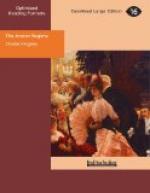But, alas! the seed sown grew up into strange shapes, according to the soil in which it rooted. False doctrine, heresy, and schism, according to Herr Findel, the learned and rational historian whom I have chiefly followed, defiled the new Church from its infancy. “In France,” so he bemoans himself, “first of all there shot up that baneful seed of lies and frauds, of vanity and presumption, of hatred and discord, the mischievous high degrees; the misstatement that our order was allied to the Templars, and existed at the time of the Crusades; the removal of old charges, the bringing in surreptitiously of a multitude of symbols and forms which awoke the love of secrecy; knighthood; and, in fact, all which tended to poison Freemasonry.” Herr Findel seems to attribute these evils principally to the “high degrees.” It would have been more simple to have attributed them to the morals of the French noblesse in the days of Louis Quinze. What could a corrupt tree bring forth, but corrupt fruit? If some of the early lodges, like those of “La Felicite” and “L’Ancre,” to which women were admitted, resembled not a little the Bacchic mysteries of old Rome, and like them called for the interference of the police, still no great reform was to be expected, when those Sovereign Masonic Princes, the “Emperors of the East and West,” quarrelled—knights of the East against knights of the West—till they were absorbed or crushed by the Lodge “Grand Orient,” with Philippe Egalite, Duc de Chartres, as their grand master, and as his representative, the hero of the diamond necklace, and disciple of Count Cagliostro—Louis, Prince de Rohan.
But if Freemasonry, among the frivolous and sensual French noblesse, became utterly frivolous and sensual itself, it took a deeper, though a questionably fantastic form, among the more serious and earnest German nobility. Forgetful as they too often were of their duty to their peoples—tyrannical, extravagant, debauched by French opinions, French fashions, French luxuries, till they had begun to despise their native speech, their native literature, almost their native land, and to hide their native homeliness under a clumsy varnish of French outside civilisation, which the years 1807-13 rubbed off them again with a brush of iron—they were yet Germans at heart; and that German instinct for the unseen—call it enthusiasm, mysticism, what you will, you cannot




